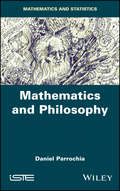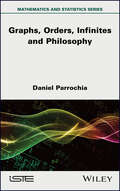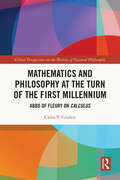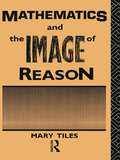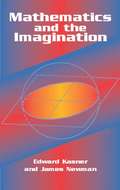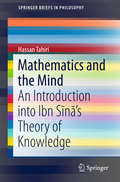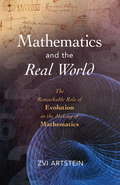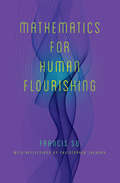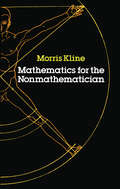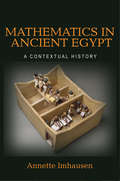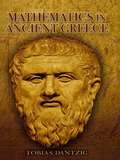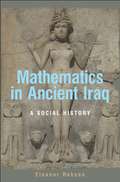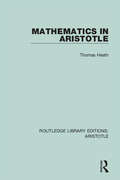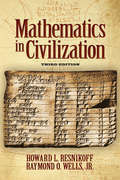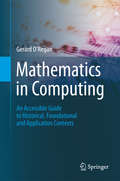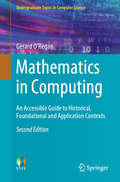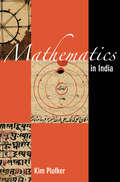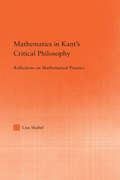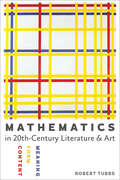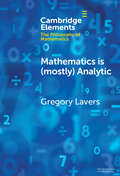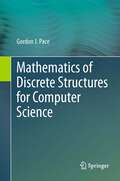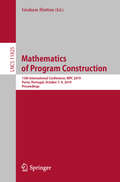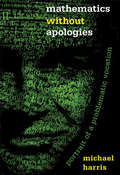- Table View
- List View
Mathematics and Philosophy
by Daniel ParrochiaThis book, which studies the links between mathematics and philosophy, highlights a reversal. Initially, the (Greek) philosophers were also mathematicians (geometers). Their vision of the world stemmed from their research in this field (rational and irrational numbers, problem of duplicating the cube, trisection of the angle...). Subsequently, mathematicians freed themselves from philosophy (with Analysis, differential Calculus, Algebra, Topology, etc.), but their researches continued to inspire philosophers (Descartes, Leibniz, Hegel, Husserl, etc.). However, from a certain level of complexity, the mathematicians themselves became philosophers (a movement that begins with Wronsky and Clifford, and continues until Grothendieck).
Mathematics and Philosophy 2: Graphs, Orders, Infinites and Philosophy
by Daniel ParrochiaFrom Pythagoreans to Hegel, and beyond, this book gives a brief overview of the history of the notion of graphs and introduces the main concepts of graph theory in order to apply them to philosophy. In addition, this book presents how philosophers can use various mathematical notions of order. Throughout the book, philosophical operations and concepts are defined through examining questions relating the two kinds of known infinities – discrete and continuous – and how Woodin's approach can influence elements of philosophy. We also examine how mathematics can help a philosopher to discover the elements of stability which will help to build an image of the world, even if various approaches (for example, negative theology) generally cannot be valid. Finally, we briefly consider the possibilities of weakening formal thought represented by fuzziness and neutrosophic graphs. In a nutshell, this book expresses the importance of graphs when representing ideas and communicating them clearly with others.
Mathematics and Philosophy at the Turn of the First Millennium: Abbo of Fleury on Calculus (Global Perspectives on the History of Natural Philosophy)
by Clelia V. CrialesiAt the turn of the first millennium, scientific and philosophical knowledge was far from dormant. Arithmetic, with its diverse calculation techniques and number theory, served as a bridge to philosophy, theology, and the study of the physical world. Even something as simple as a series of multiplication tables could unlock a profound knowledge of both the divine realm and natural phenomena. Such is the case with Abbo of Fleury’s Commentary on the Calculus.Mathematics and Philosophy at the Turn of the First Millennium sheds light on Abbo’s original philosophical system anchored in two central doctrines, which serve as a compass to navigate it: the theory of unity (henology) and the theory of composition. Yet, the Commentary on the Calculus covers much more. The present study, thus, explores an eclectic range of topics – from water clocks to barleycorns, constellations to human voice, synodic month to the human lifespan, and numbers to God. Abbo’s work is an ambitious attempt to tie together the study of both the visible and invisible realms, what can be measured and what cannot, what can be quantified and what exceeds quantification.Scholars and students of the history of philosophy and mathematics will be introduced to a pivotal figure from an often overlooked era. They will be provided with fresh insights into the spread of Neopythagorean doctrines in the early Middle Ages, as they learn how these ideas were transmitted through arithmetic texts and harmonised with theology and natural philosophy. They will also get to know the medieval fraction system and calculus practices.
Mathematics and the Body
by Nathalie Sinclair Elizabeth De FreitasThis book explores alternative ways to consider the relationship between mathematics and the material world. Drawing on the philosophy of Gilles Châtelet and the post-humanist materialism of Karen Barad, the authors present an 'inclusive materialist' approach to studying mathematics education. This approach offers a fresh perspective on human and nonhuman bodies, challenging current assumptions about the role of the senses, language, and ability in teaching and learning mathematics. Each chapter provides empirical examples from the classroom that demonstrate how inclusive materialism can be applied to a wide range of concerns in the field. The authors analyze recent studies on students' gestures, expressions, and drawings in order to establish a link between mathematical activity and mathematical concepts. Mathematics and the Body expands the landscape of research in mathematics education and will be an essential resource for teachers, students, and researchers alike.
Mathematics and the Image of Reason (Philosophical Issues in Science)
by Mary TilesA thorough account of the philosophy of mathematics. In a cogent account the author argues against the view that mathematics is solely logic.
Mathematics and the Imagination (Dover Books on Mathematics)
by James Newman Edward KasnerAnyone who gambles, plays cards, loves puzzles, or simply seeks an intellectual challenge will love this amusing and thought-provoking book. With wit and clarity, the authors deftly progress from simple arithmetic to calculus and non-Euclidean geometry. "Charming and exciting." -- Saturday Review of Literature. Includes 169 figures.
Mathematics and the Mind
by Hassan TahiriThis book examines how epistemology was reinvented by Ibn Sīnā, an influential philosopher-scientist of the classical Islamic world who was known to the West by the Latinised name Avicenna. It explains his theory of knowledge in which intentionality acts as an interaction between the mind and the world. This, in turn, led Ibn Sīnā to distinguish an operation of intentionality specific to the generation of numbers. The author argues that Ibn Sīnā's transformation of philosophy is one of the major stages in the de-hellinisation movement of the Greek heritage that was set off by the advent of the Arabic-Islamic civilisation. Readers first learn about Ibn Sīnā's unprecedented investigation into the concept of the number and his criticism of such Greek thought as Plato's realism, Pythagoreans' empiricism, and Ari stotle's conception of existence. Next, coverage sets out the basics of Ibn Sīnā's theory of knowledge needed for the construction of numbers. It describes how intentionality turns out to be key in showing the ontological dependence of numbers as well as even more critical to their construction. In describing the various mental operations that make mathematical objects intentional entities, Ibn Sīnā developed powerful arguments and subtle analyses to show us the extent our mental life depends on intentionality. This monograph thoroughly explores the epistemic dimension of this concept, which, the author believes, can also explain the actual genesis and evolution of mathematics by the human mind.
Mathematics and the Real World
by Zvi ArtsteinIn this accessible and illuminating study of how the science of mathematics developed, a veteran math researcher and educator looks at the ways in which our evolutionary makeup is both a help and a hindrance to the study of math.Artstein chronicles the discovery of important mathematical connections between mathematics and the real world from ancient times to the present. The author then describes some of the contemporary applications of mathematics--in probability theory, in the study of human behavior, and in combination with computers, which give mathematics unprecedented power.The author concludes with an insightful discussion of why mathematics, for most people, is so frustrating. He argues that the rigorous logical structure of math goes against the grain of our predisposed ways of thinking as shaped by evolution, presumably because the talent needed to cope with logical mathematics gave the human race as a whole no evolutionary advantage. With this in mind, he offers ways to overcome these innate impediments in the teaching of math.
Mathematics for Human Flourishing
by Francis SuAn inclusive vision of mathematics—its beauty, its humanity, and its power to build virtues that help us all flourish For mathematician Francis Su, a society without mathematical affection is like a city without concerts, parks, or museums. To miss out on mathematics is to live without experiencing some of humanity&’s most beautiful ideas. In this profound book, written for a wide audience but especially for those disenchanted by their past experiences, an award‑winning mathematician and educator weaves parables, puzzles, and personal reflections to show how mathematics meets basic human desires—such as for play, beauty, freedom, justice, and love—and cultivates virtues essential for human flourishing. These desires and virtues, and the stories told here, reveal how mathematics is intimately tied to being human. Some lessons emerge from those who have struggled, including philosopher Simone Weil, whose own mathematical contributions were overshadowed by her brother&’s, and Christopher Jackson, who discovered mathematics as an inmate in a federal prison. Christopher&’s letters to the author appear throughout the book and show how this intellectual pursuit can—and must—be open to all.
Mathematics for the Nonmathematician
by Morris KlinePractical, scientific, philosophical, and artistic problems have caused men to investigate mathematics. But there is one other motive which is as strong as any of these--the search for beauty. Mathematics is an art, and as such affords the pleasures which all the arts afford." In this erudite, entertaining college-level text, Morris Kline, Professor Emeritus of Mathematics at New York University, provides the liberal arts student with a detailed treatment of mathematics in a cultural and historical context. The book can also act as a self-study vehicle for advanced high school students and laymen. Professor Kline begins with an overview, tracing the development of mathematics to the ancient Greeks, and following its evolution through the Middle Ages and the Renaissance to the present day. Subsequent chapters focus on specific subject areas, such as "Logic and Mathematics," "Number: The Fundamental Concept," "Parametric Equations and Curvilinear Motion," "The Differential Calculus," and "The Theory of Probability." Each of these sections offers a step-by-step explanation of concepts and then tests the student's understanding with exercises and problems. At the same time, these concepts are linked to pure and applied science, engineering, philosophy, the social sciences or even the arts.In one section, Professor Kline discusses non-Euclidean geometry, ranking it with evolution as one of the "two concepts which have most profoundly revolutionized our intellectual development since the nineteenth century." His lucid treatment of this difficult subject starts in the 1800s with the pioneering work of Gauss, Lobachevsky, Bolyai and Riemann, and moves forward to the theory of relativity, explaining the mathematical, scientific and philosophical aspects of this pivotal breakthrough. Mathematics for the Nonmathematician exemplifies Morris Kline's rare ability to simplify complex subjects for the nonspecialist.
Mathematics in Ancient Egypt
by Annette ImhausenMathematics in Ancient Egypt traces the development of Egyptian mathematics, from the end of the fourth millennium BC--and the earliest hints of writing and number notation--to the end of the pharaonic period in Greco-Roman times. Drawing from mathematical texts, architectural drawings, administrative documents, and other sources, Annette Imhausen surveys three thousand years of Egyptian history to present an integrated picture of theoretical mathematics in relation to the daily practices of Egyptian life and social structures.Imhausen shows that from the earliest beginnings, pharaonic civilization used numerical techniques to efficiently control and use their material resources and labor. Even during the Old Kingdom, a variety of metrological systems had already been devised. By the Middle Kingdom, procedures had been established to teach mathematical techniques to scribes in order to make them proficient administrators for their king. Imhausen looks at counterparts to the notation of zero, suggests an explanation for the evolution of unit fractions, and analyzes concepts of arithmetic techniques. She draws connections and comparisons to Mesopotamian mathematics, examines which individuals in Egyptian society held mathematical knowledge, and considers which scribes were trained in mathematical ideas and why. Of interest to historians of mathematics, mathematicians, Egyptologists, and all those curious about Egyptian culture, Mathematics in Ancient Egypt sheds new light on a civilization's unique mathematical evolution.
Mathematics in Ancient Greece (Dover Books on Mathematics)
by Tobias DantzigMore than a history of mathematics, this lively book traces mathematical ideas and processes to their sources, stressing the methods used by the masters of the ancient world. Author Tobias Dantzig portrays the human story behind mathematics, showing how flashes of insight in the minds of certain gifted individuals helped mathematics take enormous forward strides. Dantzig demonstrates how the Greeks organized their precursors' melange of geometric maxims into an elegantly abstract deductive system. He also explains the ways in which some of the famous mathematical brainteasers of antiquity led to the development of whole new branches of mathematics.A book that will both instruct and delight the mathematically minded, this volume is also a treat for readers interested in the history of science. Students and teachers of mathematics will particularly appreciate its unusual combination of human interest and sound scholarship.
Mathematics in Ancient Iraq: A Social History
by Eleanor RobsonThis monumental book traces the origins and development of mathematics in the ancient Middle East, from its earliest beginnings in the fourth millennium BCE to the end of indigenous intellectual culture in the second century BCE when cuneiform writing was gradually abandoned. Eleanor Robson offers a history like no other, examining ancient mathematics within its broader social, political, economic, and religious contexts, and showing that mathematics was not just an abstract discipline for elites but a key component in ordering society and understanding the world. The region of modern-day Iraq is uniquely rich in evidence for ancient mathematics because its prehistoric inhabitants wrote on clay tablets, many hundreds of thousands of which have been archaeologically excavated, deciphered, and translated. Drawing from these and a wealth of other textual and archaeological evidence, Robson gives an extraordinarily detailed picture of how mathematical ideas and practices were conceived, used, and taught during this period. She challenges the prevailing view that they were merely the simplistic precursors of classical Greek mathematics, and explains how the prevailing view came to be. Robson reveals the true sophistication and beauty of ancient Middle Eastern mathematics as it evolved over three thousand years, from the earliest beginnings of recorded accounting to complex mathematical astronomy. Every chapter provides detailed information on sources, and the book includes an appendix on all mathematical cuneiform tablets published before 2007.
Mathematics in Aristotle: 1949 Edition (Routledge Library Editions: Aristotle #5)
by Thomas HeathOriginally published in 1949. This meticulously researched book presents a comprehensive outline and discussion of Aristotle’s mathematics with the author's translations of the greek. To Aristotle, mathematics was one of the three theoretical sciences, the others being theology and the philosophy of nature (physics). Arranged thematically, this book considers his thinking in relation to the other sciences and looks into such specifics as squaring of the circle, syllogism, parallels, incommensurability of the diagonal, angles, universal proof, gnomons, infinity, agelessness of the universe, surface of water, meteorology, metaphysics and mechanics such as levers, rudders, wedges, wheels and inertia. The last few short chapters address ‘problems’ that Aristotle posed but couldn’t answer, related ethics issues and a summary of some short treatises that only briefly touch on mathematics.
Mathematics in Civilization, Third Edition (Dover Books on Mathematics)
by Raymond O. Wells Jr. Howard L. ResnikoffSpace flight, computers, lasers, and information technology - these are but a few examples of the spectacular growth, development, and far-reaching applications of mathematics. But what of the field's past? Upon which intellectual milestones were the foundations of modern mathematics constructed? How has our comprehension of the physical universe, language, and the nature of thought itself been influenced and informed by the developments of mathematics through the ages?This lucid presentation examines how mathematics shaped and was shaped by the course of human events. In a format suited to college-level studies as well as popular reading, the book explores trigonometry, navigation, cartography, logarithms, algebra, and calculus through ancient, medieval, post-Renaissance, and modern times. Solutions to problems appear at the end of each chapter, and this edition has been newly expanded to include a supplement on events in mathematics since the 1985 publication of the first Dover edition. Acclaimed by Telegraphic Reviews as "an exceptionally good liberal arts math text," this highly readable treatment makes a technical subject vividly fascinating.
Mathematics in Computing
by Gerard O’reganThis clearly written and enlightening textbook provides a concise, introductory guide to the key mathematical concepts and techniques used by computer scientists. Topics and features: ideal for self-study, offering many pedagogical features such as chapter-opening key topics, chapter introductions and summaries, review questions, and a glossary; places our current state of knowledge within the context of the contributions made by early civilizations, such as the ancient Babylonians, Egyptians and Greeks; examines the building blocks of mathematics, including sets, relations and functions; presents an introduction to logic, formal methods and software engineering; explains the fundamentals of number theory, and its application in cryptography; describes the basics of coding theory, language theory, and graph theory; discusses the concept of computability and decideability; includes concise coverage of calculus, probability and statistics, matrices, complex numbers and quaternions.
Mathematics in Computing: An Accessible Guide to Historical, Foundational and Application Contexts (Undergraduate Topics in Computer Science)
by Gerard O’ReganThis illuminating textbook provides a concise review of the core concepts in mathematics essential to computer scientists. Emphasis is placed on the practical computing applications enabled by seemingly abstract mathematical ideas, presented within their historical context. The text spans a broad selection of key topics, ranging from the use of finite field theory to correct code and the role of number theory in cryptography, to the value of graph theory when modelling networks and the importance of formal methods for safety critical systems.This fully updated new edition has been expanded with a more comprehensive treatment of algorithms, logic, automata theory, model checking, software reliability and dependability, algebra, sequences and series, and mathematical induction.Topics and features: includes numerous pedagogical features, such as chapter-opening key topics, chapter introductions and summaries, review questions, and a glossary; describes the historical contributions of such prominent figures as Leibniz, Babbage, Boole, and von Neumann; introduces the fundamental mathematical concepts of sets, relations and functions, along with the basics of number theory, algebra, algorithms, and matrices; explores arithmetic and geometric sequences and series, mathematical induction and recursion, graph theory, computability and decidability, and automata theory; reviews the core issues of coding theory, language theory, software engineering, and software reliability, as well as formal methods and model checking; covers key topics on logic, from ancient Greek contributions to modern applications in AI, and discusses the nature of mathematical proof and theorem proving; presents a short introduction to probability and statistics, complex numbers and quaternions, and calculus.This engaging and easy-to-understand book will appeal to students of computer science wishing for an overview of the mathematics used in computing, and to mathematicians curious about how their subject is applied in the field of computer science. The book will also capture the interest of the motivated general reader.
Mathematics in India
by Kim PlofkerBased on extensive research in Sanskrit sources, Mathematics in India chronicles the development of mathematical techniques and texts in South Asia from antiquity to the early modern period. Kim Plofker reexamines the few facts about Indian mathematics that have become common knowledge--such as the Indian origin of Arabic numerals--and she sets them in a larger textual and cultural framework. The book details aspects of the subject that have been largely passed over in the past, including the relationships between Indian mathematics and astronomy, and their cross-fertilizations with Islamic scientific traditions. Plofker shows that Indian mathematics appears not as a disconnected set of discoveries, but as a lively, diverse, yet strongly unified discipline, intimately linked to other Indian forms of learning. Far more than in other areas of the history of mathematics, the literature on Indian mathematics reveals huge discrepancies between what researchers generally agree on and what general readers pick up from popular ideas. This book explains with candor the chief controversies causing these discrepancies--both the flaws in many popular claims, and the uncertainties underlying many scholarly conclusions. Supplementing the main narrative are biographical resources for dozens of Indian mathematicians; a guide to key features of Sanskrit for the non-Indologist; and illustrations of manuscripts, inscriptions, and artifacts. Mathematics in India provides a rich and complex understanding of the Indian mathematical tradition. **Author's note: The concept of "computational positivism" in Indian mathematical science, mentioned on p. 120, is due to Prof. Roddam Narasimha and is explored in more detail in some of his works, including "The Indian half of Needham's question: some thoughts on axioms, models, algorithms, and computational positivism" (Interdisciplinary Science Reviews 28, 2003, 1-13).
Mathematics in Kant's Critical Philosophy: Reflections on Mathematical Practice
by Lisa ShabelFirst published in 2003. Routledge is an imprint of Taylor & Francis, an informa company.
Mathematics in Twentieth-Century Literature & Art: Content, Form, Meaning
by Robert TubbsThe author of What Is a Number? examines the relationship between mathematics and art and literature of the 20th century.During the twentieth century, many artists and writers turned to abstract mathematical ideas to help them realize their aesthetic ambitions. Man Ray, Marcel Duchamp, and, perhaps most famously, Piet Mondrian used principles of mathematics in their work. Was it coincidence, or were these artists following their instincts, which were ruled by mathematical underpinnings, such as optimal solutions for filling a space? If math exists within visual art, can it be found within literary pursuits? In short, just what is the relationship between mathematics and the creative arts?In this exploration of mathematical ideas in art and literature, Robert Tubbs argues that the links are much stronger than previously imagined and exceed both coincidence and commonality of purpose. Not only does he argue that mathematical ideas guided the aesthetic visions of many twentieth-century artists and writers, Tubbs further asserts that artists and writers used math in their creative processes even though they seemed to have no affinity for mathematical thinking.In the end, Tubbs makes the case that art can be better appreciated when the math that inspired it is better understood. An insightful tour of the great masters of the last century and an argument that challenges long-held paradigms, this book will appeal to mathematicians, humanists, and artists, as well as instructors teaching the connections among math, literature, and art.“Though the content of Tubbs’s book is challenging, it is also accessible and should interest many on both sides of the perceived divide between mathematics and the arts.” —Choice
Mathematics in Twentieth-Century Literature and Art: Content, Form, Meaning
by Robert TubbsChips away at the notion of an accidental relationship between math and art and literature.During the twentieth century, many artists and writers turned to abstract mathematical ideas to help them realize their aesthetic ambitions. Man Ray, Marcel Duchamp, and, perhaps most famously, Piet Mondrian used principles of mathematics in their work. Was it mere coincidence, or were these artists simply following their instincts, which in turn were ruled by mathematical underpinnings, such as optimal solutions for filling a space? If math exists within visual art, can it be found within literary pursuits? In short, just what is the relationship between mathematics and the creative arts?In this provocative, original exploration of mathematical ideas in art and literature, Robert Tubbs argues that the links are much stronger than previously imagined and exceed both coincidence and commonality of purpose. Not only does he argue that mathematical ideas guided the aesthetic visions of many twentieth-century artists and writers, Tubbs further asserts that artists and writers used math in their creative processes even though they seemed to have no affinity for mathematical thinking. In the end, Tubbs makes the case that art can be better appreciated when the math that inspired it is better understood. An insightful tour of the great masters of the last century and an argument that challenges long-held paradigms, Mathematics in Twentieth-Century Literature and Art will appeal to mathematicians, humanists, and artists, as well as instructors teaching the connections among math, literature, and art.
Mathematics is (Elements in the Philosophy of Mathematics)
by Gregory LaversThis Element outlines and defends an account of analyticity according to which mathematics is, for the most part, analytic. The author begins by looking at Quine's arguments against the concepts of analyticity. He shows how Quine's position on analyticity is related to his view on explication and shows how this suggests a way of defining analyticity that would meet Quine's own standards for explication. The author then looks at Boghossian and his distinction between epistemic and metaphysical accounts of analyticity. Here he argues that there is a straightforward way of eliminating the confusion Boghossian sees with what he calls metaphysical accounts. The author demonstrates that the epistemic dimension of his epistemic account is almost entirely superfluous. The author then discusses how analyticity is related to truth, necessity, and questions of ontology. Finally, he discusses the vagueness of analyticity and also the relation of analyticity to the axiomatic method in mathematics.
Mathematics of Discrete Structures for Computer Science
by Gordon J. PaceMathematics plays a key role in computer science, some researchers would consider computers as nothing but the physical embodiment of mathematical systems. And whether you are designing a digital circuit, a computer program or a new programming language, you need mathematics to be able to reason about the design -- its correctness, robustness and dependability. This book covers the foundational mathematics necessary for courses in computer science. The common approach to presenting mathematical concepts and operators is to define them in terms of properties they satisfy, and then based on these definitions develop ways of computing the result of applying the operators and prove them correct. This book is mainly written for computer science students, so here the author takes a different approach: he starts by defining ways of calculating the results of applying the operators and then proves that they satisfy various properties. After justifying his underlying approach the author offers detailed chapters covering propositional logic, predicate calculus, sets, relations, discrete structures, structured types, numbers, and reasoning about programs. The book contains chapter and section summaries, detailed proofs and many end-of-section exercises -- key to the learning process. The book is suitable for undergraduate and graduate students, and although the treatment focuses on areas with frequent applications in computer science, the book is also suitable for students of mathematics and engineering.
Mathematics of Program Construction: 13th International Conference, MPC 2019, Porto, Portugal, October 7–9, 2019, Proceedings (Lecture Notes in Computer Science #11825)
by Graham HuttonThis book constitutes the refereed proceedings of the 13th International Conference on Mathematics of Program Construction, MPC 2019, held in Porto, Portugal, in October 2019. The 15 revised full papers presented together with an invited paper were carefully reviewed and selected from 22 submissions. The papers deal with mathematical principles and techniques for constructing computer programs. They range from algorithmics to support for program construction in programming languages and systems. Some typical areas are type systems, program analysis and transformation, programming-language semantics, security, and program logics.
Mathematics without Apologies
by Michael HarrisWhat do pure mathematicians do, and why do they do it? Looking beyond the conventional answers--for the sake of truth, beauty, and practical applications--this book offers an eclectic panorama of the lives and values and hopes and fears of mathematicians in the twenty-first century, assembling material from a startlingly diverse assortment of scholarly, journalistic, and pop culture sources.Drawing on his personal experiences and obsessions as well as the thoughts and opinions of mathematicians from Archimedes and Omar Khayyám to such contemporary giants as Alexander Grothendieck and Robert Langlands, Michael Harris reveals the charisma and romance of mathematics as well as its darker side. In this portrait of mathematics as a community united around a set of common intellectual, ethical, and existential challenges, he touches on a wide variety of questions, such as: Are mathematicians to blame for the 2008 financial crisis? How can we talk about the ideas we were born too soon to understand? And how should you react if you are asked to explain number theory at a dinner party?Disarmingly candid, relentlessly intelligent, and richly entertaining, Mathematics without Apologies takes readers on an unapologetic guided tour of the mathematical life, from the philosophy and sociology of mathematics to its reflections in film and popular music, with detours through the mathematical and mystical traditions of Russia, India, medieval Islam, the Bronx, and beyond.
